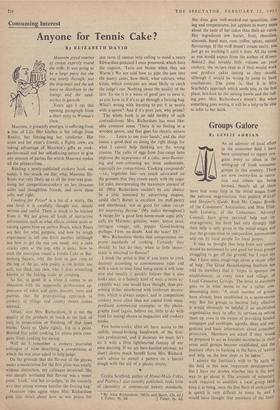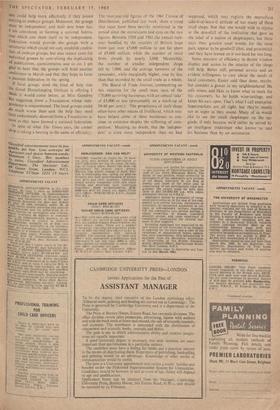Groups Galore
By LESLIE ADRIAN As an admirer of local effort in the consumer field I have been concerned to report pro- gress every so often in the setting-up of local, consumer groups in this country. There are now twenty-five in opera- tion and others are being formed. Nearly all of them have had some help in the initial stages from the national organisations that publish Which? and Shopper's Guide. Both Mr. Caspar Brook, of the Consumers' Association, and Miss Eliza- beth Gundrey, of the Consumers' Advisory Council, have given personal help and en- couragement, but both feel very strongly that their help is only given in the initial stages and that the groups must be independent, autonomous and run by local people for local people.
It may be thought that help from any source would be welcomed by and good for local groups struggling to get off the ground, but I must say that I have some misgivings about a recent offer of help. The Good Housekeeping Institute has told its members that it 'hopes to sponsor the establishment, in every town ' and village, of Local Consumer Groups.' The letter to members goes on in what seems to me a rather con- descending tone: 'A small number of groups have already been established in a spontaneous way. But for groups to become fully effective it would obviously be helpful if an established organisation were to offer its services in setting them up, even to the extent of providing headed notepaper and envelopes, agenda, ideas and sug" gestions and basic information about consumer protection.' Members are asked if they would be prepared to act as founder-secretaries in their areas until groups become established, and the Institute offers its backing in the form of 'advice and help on the best steps to be taken.'
I admire the Institute's wish to `be early in the field in this new, important development, but I have my doubts whether this is the best way to go about it. The amount of voluntary work required to establish a local group (and keep it in being, once the first flush of enthusiasin is spent) is very difficult to come by and .1 would have thought that members of the Instt
lute could help more effectively if they joined existing or embryo groups. Moreover, the groups must be independent, and their best hope lies, ) am convinced, in forming a national federa- tion which can show itself to be independent. Federation would provide the groups with a secretariat which could not only establish creden- tials of embryo groups, but also reduce costs for Individual groups by centralising the duplicating of publications, questionnaires and so on. I am glad to hear that the groups will hold another conference in March and that they hope to form a national federation in the spring.
If local groups need the kind of help that the Good Housekeeping Institute is offering 1 think it would come better, as Miss Gundrey has suggested, from a Foundation whose inde- pendence is unquestioned. The local groups could do much worse than seek the help they need (and undoubtedly deserve) from a Foundation as soon as they have formed a national federation.
In spite of what The Times says, the corner shop is taking a beating in the name of efficiency. The two-year-old figures of the 1961 Census of Distribution, published last week. show a trend that must have been heavily reinforced in the period since the statisticians laid eyes on the raw figures. Between 1950 and 196I.the annual turn- over handled by the retailers of Britain leapt from just over £5,000 million to not far short of £9,000 million, while the number of retail firms shrank by nearly 3,000. Meanwhile, the number of smaller independent shops fell by 7,000, and the average turnover of the remainder, while marginally higher, rose by less than that recorded by the retail trade as a whole.
The Board of Trade Journal, commenting on this situation for the small man, says, of the 178,000 surviving businesses with an annual `take' of £5.000 or less (presumably on a mark-up of 30-40 per cent.): 'The proprietors of such shops often have other means of livelihood, which may have helped some of these businesses to con- tinue in existence despite the stiffening of com- petition..' Meaning, no doubt, that the 'indepen- dent' is even more independent than we had
supposed, which may explain the marvellous take-it-or-leave-it attitude of too many of these local shops. Not that one would wish to rejoice at the downfall of the institution that gave us the label of a nation of shopkeepers, but these days their greatest asset would, for the most part, appear to be goodwill (that, and proximity), and they have leaned on it too hard for too long.
Some measure of efficiency (a decent window display and access to the interior of the shop) will help. Better still, personal service and an evident willingness to care about the needs of local customers. Easier said than done, maybe, but consider a grocer in my neighbourhood. He sells wines, and likes to know what to stock for his customers. So he holds wine-tastings, and keeps his ears open. That's what I call enterprise. Supermarkets are all right, but they're mostly not as super as they sound. Many of us would like to see the small shopkeeper on the up- grade, if only because we'd rather be served by an intelligent tradesman who knows- us and his business than by an automaton.



































 Previous page
Previous page